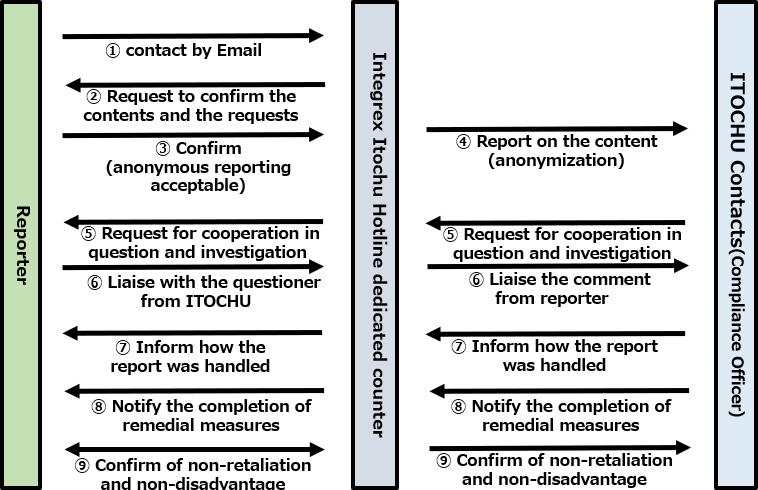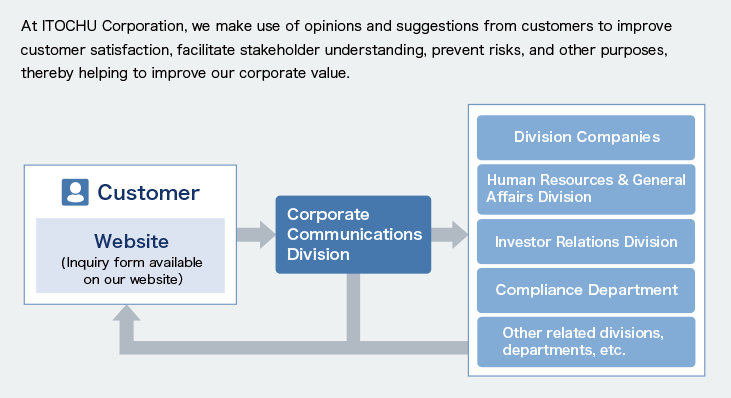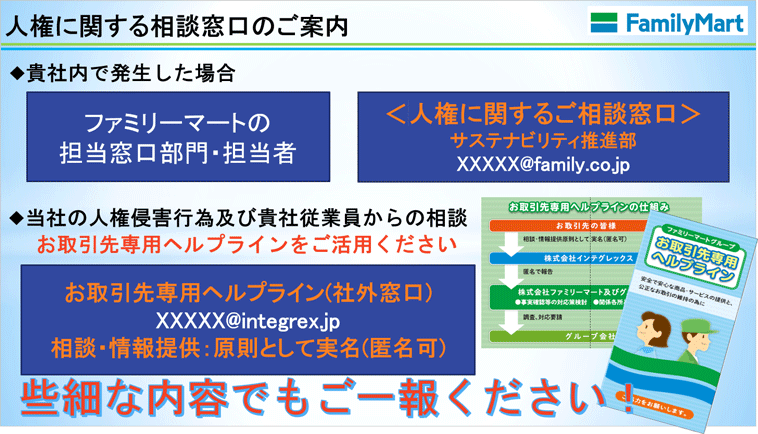Respect and Consideration for Human Rights
Policy and Basic Concept
Respect and consideration for human rights is an important issue for ITOCHU as we deploy our business activities in various regions around the world. ITOCHU also asks all our stakeholders to approve, understand and put into practice the human rights policy of ITOCHU in addition to education for employees to respond to this important issue.
The ITOCHU Group Human Rights Policy
The ITOCHU Group has adopted the "ITOCHU Group Human Rights Policy" (hereinafter "the Policy"), drafted based on our Corporate Mission, Guideline of Conduct, Code of Ethical Conduct, and The ITOCHU Group Sustainability Policy. This Policy iterates our commitment to respect the human rights of our stakeholders and address negative impacts that may arise from our business activities.
- 1. Policy Scope and Our Expectations Toward Business Partners
This Policy applies to all worldwide executives and employees of the ITOCHU Group, including contractors and temporary employees. The ITOCHU Group also expects business partners and other relevant stakeholders to comply with this Policy.
- 2. Endorsement of International Agreement
The ITOCHU Group supports international agreements on human rights, including the Universal Declaration of Human Rights, the International Labour Organization's Declaration on Fundamental Principles and Rights at Work, and the United Nations Global Compact, which we have been a signatory to since 2009. We will also implement measures aligning to the United Nations Guiding Principles on Business and Human Rights.
- 3. Legal Compliance and Respect for Internationally Recognized Human Rights
The ITOCHU Group will comply with the laws and regulations in the respective countries and regions where we perform our business activities in addition to Japan. If there is a contradiction between internationally recognized human rights and the laws and ordinances of a country or region, we will pursue a method to maximize respect for international human rights principles.
- 4. Management Approach
The ITOCHU Group will build structures to realize this Policy. The Sustainability Officer will bear the responsibility to oversee the compliance and implementation situation of this Policy.
- 5. Human Rights Due Diligence
Based on the United Nations Guiding Principles on Business and Human Rights, the ITOCHU Group will implement human rights due diligence in order to identify, prevent and mitigate negative impacts on human rights and fulfill our commitment to accountability.
- 6. Remedy and Rectification
If the business activities of the ITOCHU Group induce a negative impact on human rights or if involvement in such becomes clear, we will strive to remedy and rectify that through appropriate procedures and dialogue.
- 7. Dialogue and Consultations
The ITOCHU Group will leverage external human rights expertise in its implementation of human rights due diligence and will engage in dialogues and consultations with our stakeholders – especially those potentially subject to adverse impacts from our business activities.
- 8. Education and Awareness
The ITOCHU Group will provide appropriate education to all executives and employees (including contractors and temporary employees) and strive to raise human rights awareness in order to incorporate and implement this Policy in our business activities.
- 9. Communication on this Policy and Our Relevant Initiatives
This Policy will be approved by senior executive in charge of sustainability and be reported to our Board of Directors and we will widely publish it to the public. We will also report on our human rights initiatives based on this Policy on the ITOCHU website and in our ESG Report.
Fumihiko Kobayashi
Member of the Board
Executive Vice President
Chief Administrative Officer
Established in April 2019
Revised in April 2020
Refer to: Code of Ethical Conduct
Individual Policy
Response to Modern Slavery and Human Trafficking
ITOCHU is committed to initiatives to ensure that there is no modern slavery or human trafficking in our supply chain and business activities. We are participating in the United Nations Global Compact. Together with this, we are reflecting the concept of the United Nations Guiding Principles on Business and Human Rights in our business activities. Our existing principles contain initiatives to ensure that modern slavery and human trafficking do not occur in our sales activities and supply chain across the world.
Refer to:Status of Initiatives at ITOCHU Europe PLC. (Slavery and Human Trafficking Statement)![]()
Consideration for Foreigners
If foreign workers, interns and trainees are accepted in our supply chain, we pay full attention so that we comply with the labor related laws and ordinances in the country concerned and so that we do not commit acts contrary to the purpose of that acceptance system. We do this from the point of view of respect for human rights and relief because such people are liable to become the target of illegal acts due to their low social and economic status.
Respect for the Rights of Children
ITOCHU supports the United Nations Convention on the Rights of the Child and Children's Rights and Business Principles. We respect the four pillars of the United Nations Convention on the Rights of the Child - a child's right to life, development, protection and participation.
ITOCHU has adopted the development of the future generation as one of the ITOCHU Group Basic Activity Guidelines on Social Contribution. We perform activities to support the healthy development of the young people who will be responsible for the future generation.
Refer to:Growth of Future Generations
Policy on the Use of Security Guards
In order to ensure the safety of our business operations in various parts of the world, ITOCHU uses security personnel. When necessary, we may employ armed security personnel. We are aware of the potential risk of human rights violations that may accompany the handling of weapons, and employ personnel in each country based not only on adherence to local law but also on international standards.*
- United Nations Global Compact, Voluntary Principles on Security and Human Rights, Code of Conduct for Law Enforcement Officials, Basic Principles on the Use of Force and Firearms by Law Enforcement Officials, etc.
Respect for the Rights of Indigenous People
We recognize that indigenous people have their own culture and history when we conduct business activities in regions where indigenous people live as part of our commitment to respect human rights. We respect and take into consideration the rights of indigenous people established in the laws of the countries and regions where we perform our business activities and international agreements (e.g., the Declaration on the Rights of Indigenous Peoples and the International Labour Organization (ILO) Convention 169). When examining new business investment projects, we also strictly enforce prior checks concerning the impact on the rights of indigenous people by that business.
Job Creation and Employment Concept
The ITOCHU Group works to make local contributions by local hiring during the diverse business activities we engage in around the world. We strive for coexistence with the local regions in which we operate and to contribute to the development of international society. We comply with the statutory minimum wage and strive to pay at least a living wage when we hire local employees. Doing so leads to human resource development in the region and helps stimulate local economies. Moreover, we believe this contributes to sustainable development. When an ITOCHU Group company in Japan or overseas engages in business activities in a particular region, as the parent company, ITOCHU supports to formation of a management structure for ensuring that the company complies with relevant laws and provides an optimal labor environment for its employees. (Group companies report to division companies based on their operating domain and the division company provides direct support.) The ITOCHU Group is comprised of some 300 companies in Japan and overseas, and works to balance business and regional development by hiring and training local staff.
Policy on Decommissioning of Mining Operations
Mining projects can have adverse impacts on the environment and society in the area where the development is to take place, including water, air, land and soil, landscape, and local residents. We believe it is important to minimize any effects on the environment and society, including biodiversity and human rights. It is therefore important to have a long-term plan in advance that takes into account the impacts during the project study and development stage, the operational stage, and also after the mine decommissioning and closure in the future. When decommissioning mining operations, the ITOCHU Group undertakes appropriate measures based on laws and regulations as well as a mine decommissioning plan. In our mineral resource development and operational business, we have prepared Environment, Health, Safety (EHS) guidelines based on international standards such as the International Finance Corporation (IFC)’s Environment, Health, Safety (EHS) guidelines. In accordance with these guidelines, we have developed a rehabilitation and mine closure plan that takes various stakeholders into account, and we undertake long-term monitoring after closure to minimize the negative impacts of mining business and maximize social benefits.
Oaky Creek Coal Mine Rehabilitation


Through ITOCHU Minerals & Energy of Australia Pty Ltd, our wholly owned subsidiary, we are participating in the active Oaky Creek coking coal mine in Queensland, Australia. The Oaky Creek project has developed a rehabilitation plan for the mine area in advance of its closure based on the decommissioning policy mentioned above and reviewed and assessed by experts for environmental and social impacts that might occur prior to or after the mine closure. Decommissioning and rehabilitation costs are periodically re-evaluated and reflected in the business plan. By conducting rehabilitation according to the closure plan, the project prevents soil and water pollution, promotes the restoration of the ecosystem, and ensures the health and safety of local residents.
For example, pits created by coal mining are backfilled using topsoil excavated during the mining process, and are then rehabilitated back to a level suitable for final land use. It is also important to conduct appropriate management of wastewater quality to prevent water pollution caused by chemical residues. In addition, appropriate management for waterway are taken. Regarding underground mining areas, detailed geological surveys are undertaken at the time of decommissioning, and measures are undertaken to prevent land subsidence and manage mine affected water.
After decommissioning, coal-washing equipment, pipelines, conveyor belts, and other surface equipment are completely removed, and ground-leveling operations are undertaken.
After backfilling and levelling are completed, planting begins. Following restoration, long-term monitoring is undertaken on land stability and plant growth.
Targets and Action Plan
 Please scroll sideways.
Please scroll sideways.
| Risks | Opportunities |
|
|
 Please scroll sideways.
Please scroll sideways.
Structures and Systems
ITOCHU promotes the formulation and implementation of action plans with respect and consideration for human rights serving as one of our key issues. Under the sustainability promotion structure, the person responsible for this issue is the Sustainability Officer while the Sustainability Management Division serves as the secretariat to constantly prevent negative impact on human rights in collaboration with the persons responsible for ESG in each division. The secretariat establishes this system and performs a review every year together with the ESG officers in each division. This content is deliberated on and reported to the Sustainability Committee. Important matters are also discussed and reported to the Board of Directors.
Structure for Promoting Human Rights: Sustainability Promotion Structure Chart
Human Rights Due Diligence
The ITOCHU Group is fulfilling our responsibility to respect human rights based on The ITOCHU Group Human Rights Policy established in April 2019. Specifically, we continuously identify and assesses the negative impact from the corporate activities of the ITOCHU Group on human rights that may affect society. We then work to prevent and mitigate such impact by taking the appropriate steps. Therefore, following the procedures detailed in the UN Guiding Principles on Business and Human Rights, we establish a human rights due diligence mechanism to assess a wide range of human rights issues, including five core labor standards (Freedom of Association and Collective Bargaining, Forced Labor, Child Labor, Discrimination, Occupational Safety and Health) set out in “The ILO Declaration on Fundamental Principles and Rights at Work.” In addition, we disclose information on the progress and results of our action.
Human Rights Due Diligence Procedure
Comprehensive Human Risk Assessment of Business
Various Material Research, Surveys, and Interviews with Sales Departments
Conduct Questionnaire Survey of Suppliers (including Indirect Suppliers) in the Priority Survey Target Business and Target Countries Based on the Results of Risk Analysis
Implement Supplier Engagements
Identify Human Rights Issues, Discuss Future Policies, and Request Remediation
Check and Follow the Progress
Impact and Assessment on Human Rights
Targeting business areas in our company, we identified salient human rights issues on which we should focus our efforts to prevent any negative impact by referring to international guidelines and indicators, such as SA 8000, with the cooperation of the external professional organization, and conducted several risk mapping.
Identified Issues
Child Labor, Forced Labor, Health and Safety, Freedom of Association and Right to Collective Bargaining, Discrimination, Disciplinary Practices, Working Hours, Remuneration
Implementation Process:
- Country Risk Mapping: Assessment on identified issues in the countries of the Suppliers’ location
Business Area Risk Mapping: Study on human rights items to consider, including identified issues
Issues Textile Machinery Metals & Minerals Energy & Chemicals Food General Products & Realty ICT & Financial Business The 8th Child Labor Forced Labor Health and Safety Freedom of Association and Right to Collective Bargaining Discrimination Disciplinary Practices Working Hours Remuneration Migrant Workers Human Trafficking Indigenous Human Rights Impact on Local Communities and Residents Land Acquisition and Resettlement - Merchandise Risk Mapping: Survey of merchandise risk levels by country
The following merchandise should be handled with particular consideration.
Selected Merchandise: cotton, clothing, palm oil, coffee, tuna, natural rubber, wood products
In our company, we continuously take into account country, business area and merchandise risk, and promote responsible procurement in consideration of human rights.
Implementation Status
We have started conducting human rights due diligence for each business sector based on the impact on and assessment of human rights as described above, starting with the Food Company in FYE 2021. We have confirmed that there were no significant negative impacts in the business fields in which we have carried out assessments in the past. In the next few years, we plan to implement human rights due diligence sequentially in all business sectors.
- Progress of Human Rights Due Diligence FYE 2025 (PDF:434KB)

- Progress of Human Rights Due Diligence FYE 2024 (PDF:372KB)

- Progress of Human Rights Due Diligence FYE 2023 (PDF:917KB)

- Progress of Human Rights Due Diligence FYE 2022 (PDF:404KB)

- Progress of Human Rights Due Diligence FYE 2021 (PDF:347KB)

At the same time, in order to mitigate human rights and labor risks in the supply chain, we continuously conduct supply chain sustainability surveys to major business partners in all business areas every year.
New Business Investment Projects
For more details, please refer to “ESG Risk Assessment for New Business Investment Projects.”
Existing Business
When entering into business with new suppliers, ITOCHU informs all applicable suppliers in advance of the Sustainability Action Guidelines for Supply Chains. If a matter in violation of the purpose of this policy is confirmed, we seek corrective measures from that supplier. At the same time, if it is judged that correction is difficult even though we have made continuous requests for correction, we deal with this under a stance of reviewing our business with that supplier.
We also perform due diligence with the seven core subjects of ISO26000 serving as the mandatory survey items (including modern slavery and human trafficking) when making new investments with major suppliers. We conduct additional due diligence with external specialist organizations for investment projects requiring a professional point of view.
Supply Chain Management
For more details, please refer to Sustainability in the Value Chain (Structures and Systems) and Response to Suppliers in Violation of this Policy.
Risk Assessments
We conduct risk assessment on human rights including modern slavery and human trafficking. We do this through group company fact-finding surveys in which we visit sites together with external experts as appropriate. This is in addition to our supplier surveys in due diligence. We have also established policies and responses for procurement by product in regards to products with a significant impact on society and the global environment. This is an attempt to reduce the risks in our supply chain.
Refer to:Human Rights Audits in the Poultry Industry in Thailand
Grievance Mechanism
The ITOCHU Group has multiple points of contact for receiving concerns and complaints from stakeholders. In case that we are found to be involved in a negative impact on human rights, we take appropriate measures to remedy the situation.
Consultation Desk for Supply Chains
ITOCHU is a regular member of the Japan Center for Engagement and Remedy on Business and Human Rights (JaCER), which provides the “Engagement and Remedy Platform” in accordance with the United Nations Guiding Principles on Business and Human Rights. This platform allows any stakeholder in the supply chain to report violations or suspected violations of international and national codes of conduct. By accepting grievances through third-party channels, we strive to ensure fairness and transparency, promote dialogue and redress more than ever, and remedy identified affected parties. When receiving reports, we ensure the anonymity of the person making the report and the confidentiality of the report.
JaCER Grievance Platform![]()
Periodic updates of information in response to the report through JaCER, including the nature of the report and its status, will be disclosed on the website of JaCER while ensuring the anonymity of whistleblowers.
Consultation Desk for Employees
We have established an employee consultation desk called 7830 (Nayami Zero) to respond to worries and consultations from each individual employee. We have also posted the HR Help Guide Book on the Intranet and have widely informed employees about the consultation desk. This means we have established a structure in which it is possible for employees to consult with us.

Career Counseling Center
ITOCHU established Career Counseling Center ahead of other companies. This center accepts workplace culture, human relations, treatment and harassment related consultations in addition to consultations on individuals’ careers by telephone, fax and e-mail. Full-time career counselors with national qualifications as career consultants deal with these consultations.
Hotline
In addition to a direct hotline to those responsible for compliance in each division, we have also established multiple whistleblowing contacts both in Japan and overseas (including external whistleblowing contacts that utilize specialized company and external lawyers). We accept reports from employees who have an employment relationship with ITOCHU, those who have been dispatched to ITOCHU under a worker dispatch contract from a company that has entered into that contract with ITOCHU (temporary employees), and employees of group companies. It prohibits the unfavorable treatment (e.g., retaliation) of whistleblowers and allows whistleblowers to provide information anonymously.
Flow When Received a Report by the Japanese External Report Reception Desk (Integrex Inc.)

ITOCHU Corporation applied for recognition under the Whistleblowing Compliance Management System (Phase 1: self-declaration of conformity), which was newly introduced by the Consumer Affairs Agency of Japan. Our conformity with certification standards was confirmed and our registration was accepted as of April 10, 2019 (first to be registered in this system in Japan).
Consultation Desk for the General Public (including Stakeholders)
ITOCHU Corporation has established a system to accept opinions, proposals, and grievances and to accept inquiries from the general public and all our stakeholders, as described below.

Refer to: Inquiries
Initiatives
Implementation of Fair Recruitment
Human resources are the greatest management resources for ITOCHU – a company deploying a variety of businesses globally. ITOCHU conducts activities to recruit those newly graduating from universities and graduate schools every year.
Relevant data: Number of Hires by Gender and Adoption Rate for Mid-Career
We also offer internships (work experience workshop) every year separate to our recruitment activities. The aim of these internships is to provide support to university and graduate school students in forming their careers. We provide opportunities to deepen knowledge about the business of trading companies and about working in a trading company.
ITOCHU recruits employees chiefly on the basis of their personal character. We recruit employees fairly and impartially without concern for their race, gender (including sexual minorities such as LGBTQs), religion, nationality, age or otherwise. We have provided human rights education with lecturers from the Tokyo Metropolitan Human Rights Promotion Center and have also reflected that content in our interviewer education. We have also established a watchdog system in which employees are selected and notified to serve as watchdogs to establish a fair recruitment screening system.
Training Programs
We raise awareness about the relationship between our corporate activities and human rights in our various internal training programs. We develop the mind to respect human rights that should be possessed as an ITOCHU person in our new employee training. For example, we hold training to acquire consideration for race, gender (including sexual minorities such as LGBTQs), religion, nationality and age from the basic concept of human rights and points of concern. We raise the problem of sexual harassment (including discriminatory behavior and harassment toward sexual orientation and gender identity) and abuse of authority in internal training aimed at organizational heads. We provide education and instruction for measures when harassment has actually occurred and when we have received reports of such. We strive to create an environment that does not allow harassment on a daily basis. Through these initiatives, we are aiming for a thorough understanding toward human rights. We are also striving to raise awareness in various regions by looking at consideration for human rights in our supply chain in pre-overseas assignment training. There were 1,402 participants in our human rights training in FYE 2024.
Relevant data: FYE 2025 Human Rights Training Record
In addition to the above training, we provide opportunities for officers and employees of ITOCHU all over the world to learn about business and human rights with online general sustainability education.
Sustainability Seminars
We have continued to hold internal seminars since FYE 2008 on human rights issues. The aim of this is to adopt insight and opinions from those outside the company. We made business and human rights (in the supply chain) a theme in FYE 2019. We then looked at the fact consideration for human rights is becoming even more important as a trend in society surrounding sustainability in FYE 2020 and FYE 2021.
We are continuing to conduct awareness activities for business and human rights. The purpose of these is to learn about the latest trends concerning corporate activities and human rights problems and to make use of that in our business as a general trading company which deploys various businesses across the world and which plays an important role in the supply chain.
Refer to: Seminar Details
Various Publications
We are endeavoring to raise awareness of human rights. The aim of this is to ensure that human rights violations do not occur in the workplace. We are doing this through various publications that we distribute to all our employees and publish on the Intranet.
- We convey our basic concept on respect for human rights through The ITOCHU Group Code of Ethical Conduct and The ITOCHU Group Human Rights Policy to all our employees.
- We call on our employees not to induce human rights violations in business in our compliance handbook. We do this by establishing pages on respect for human rights and harassment with concrete examples.
- We have described checkpoints in a handbook on communication with our suppliers. This is so that those in charge of surveys can understand the actual state of the management of human rights and labor practices in suppliers even more clearly and so that they can then offer advice on making improvements. This ensures that the supply chain sustainability survey mechanism functions. At the same time, we utilize this in keeping those in our company informed.
Countermeasures against Harassment
ITOCHU is raising awareness on the importance of making systems well-known and engaging in communication through organizational head training. We are doing this so that pregnant employees and employees persevering with their work while being engaged in childcare and nursing care can also contribute to their workplaces with a sense of their work being worthwhile. This is without employees in the workplace being subjected to abuse of authority or sexual harassment (including disadvantaging and harassing employees who are applicable to sexual minorities). Superiors encourage employees with restrictions due to balancing their work with childcare or nursing care to make use of the related systems appropriately. In addition to this, we are also ensuring employees are fully informed about the importance of reviewing work content, work division and work styles over the entire workplace. Furthermore, we have thoroughly established a workplace environment which does not allow discriminatory remarks relating to sexual orientation or gender identification and remarks made under unconscious assumptions of gender segregation. We have also established a consultation desk where employees can safely seek advice regarding harassment from both internal and external parties, including business partners and clients.
The following are clearly defined as prohibited acts in human rights violations under the work regulations: discrimination relating to work by race, gender, religion, creed, nationality, body, illness, age or any other irrational reason; sexual harassment (including discriminatory behavior and harassment relating to sexual orientation and gender identity); and workplace bullying. The regulations stipulate disciplinary action to be taken against such behavior.
In FYE 2024, we conducted “Harassment Prevention Training” targeting all manager level employees including those seconded from the company and assigned in overseas (approx. 1,800 individuals). During the training, there were lectures from experts on the causes and mechanism behind harassment and shared lessons learned from cases studies. We are striving for the elimination of any kind of harassment from all workplaces.
Human Rights Training for Ready-made Meal Manufacturers

FamilyMart, a group company, holds a regular (approximately once a year) Information-sharing Meeting on Human Rights Issues in the Supply Chain for managers involved in the hiring of ready-made meal manufacturers who supply products to FamilyMart stores and the formulation and implementation of labor-related policies. The aim of these meetings is to promote understanding of and prevent human rights risks.
The ITOCHU Group will continue to work to reduce human rights risks across our entire value chain.
Pineapple Production Business Promoting Local Employment, Supporting Living Infrastructure, and Improving Productivity
For more details, please refer to Community Contribution in Social Contribution Activities.
An Oil Project in the Caspian Sea, which Ensures a Stable Resource Supply and Contributes to Local Communities for Harmonious Cooperation
For more details, please refer to Community Contribution in Social Contribution Activities.
Cooperation with Stakeholders
Participation in Workshops on Human Rights Issues
- Business and Human Rights Academy (UNDP)
- Dialogue and Remedy Workshop (JaCER)
- Human Rights Education Subcommittee (GCNJ)
- In line with the revised company selection criteria for the Corporate Human Rights Benchmark (CHRB) undertaken by the World Benchmarking Alliance (WBA), we are not currently included in the CHRB assessment.



